Correlazioni tra la sindrome dell’intestino irritabile e altre patologie
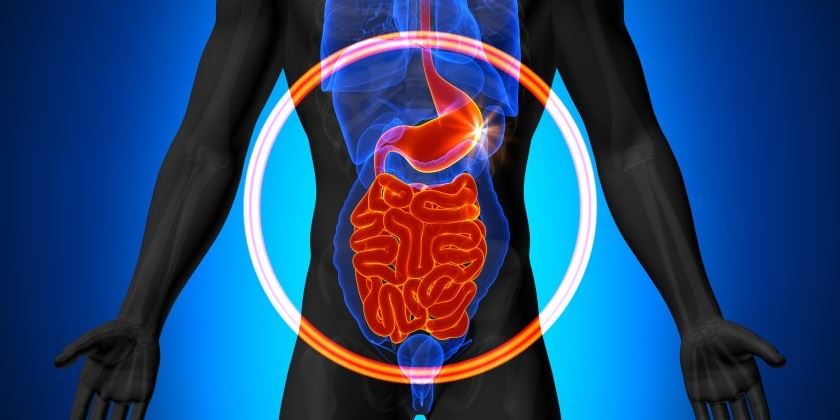
È difficile fare affermazioni concrete sulle co-prevalenze della sindrome dell’intestino irritabile. Si sospetta che tra i pazienti affetti da sindrome dell’intestino irritabile vi siano anche casi non diagnosticati di celiachia e persone con una sensibilità al glutine non celiaca. Si osserva una frequente correlazione con depressione e stati d’ansia.
Sulla correlazione della sindrome dell’intestino irritabile (SII o IBS per Irritable Bowel Syndrome) con altre patologie si è molto discusso. L’eziologia della IBS non è stata ancora completamente chiarita e i sintomi mutevoli e non specifici rendono molto difficile esprimersi su eventuali co-prevalenze. La IBS è spesso associata a disturbi somatoformi e a disturbi psichici. È ormai assodato che i pazienti affetti da IBS spesso soffrono di intolleranze alimentari, motivo per cui è opportuno formulare quanto prima una diagnosi. Studi recenti sulla prevalenza della celiachia tra i pazienti affetti da IBS, finora non hanno permesso di giungere a risultati univoci. Gli studi fanno supporre una prevalenza compresa tra lo 0,4 e l’11 per cento. Si ritiene che tra i pazienti affetti da IBS-vi siano anche persone che presentano una sensibilità al glutine non celiaca. Per fare chiarezza è necessario effettuare una diagnosi di esclusione della celiachia e adottare una dieta senza glutine in via sperimentale. Se i sintomi migliorano già nel giro di una o due settimane, il sospetto che si tratti di una sensibilità al glutine non celiaca è confermato. Oltre a intolleranze alimentari, celiachia e sensibilità al glutine non celiaca c’è ancora un vasto spettro di diagnosi differenziali in presenza di dolori addominali.
Nei pazienti affetti da IBS è fondamentale valutare e trattare in maniera adeguata anche la componente psicologica. È stato dimostrato che i bambini colpiti da dolori addominali funzionali sono più soggetti a sviluppare depressione e disturbi dell’ansia rispetto ai bambini sani. Sembra che la frequenza dei dolori addominali tra bambini e adolescenti non sia diversa a seconda che si tratti di disturbi organici o funzionali. Inoltre è stato appurato che soffrire di dolori addominali cronici durante l’infanzia aumenta il rischio che si ripresentino a lungo termine assieme ad altri sintomi somatici come l’emicrania, e a disturbi della sfera psicosociale: disturbi dell’ansia e uno scarso rendimento a scuola o sul lavoro.
Nei pazienti affetti da IBS è fondamentale valutare e trattare in maniera adeguata anche la componente psicologica. È stato dimostrato che i bambini colpiti da dolori addominali funzionali sono più soggetti a sviluppare depressione e disturbi dell’ansia rispetto ai bambini sani. Sembra che la frequenza dei dolori addominali tra bambini e adolescenti non sia diversa a seconda che si tratti di disturbi organici o funzionali. Inoltre è stato appurato che soffrire di dolori addominali cronici durante l’infanzia aumenta il rischio che si ripresentino a lungo termine assieme ad altri sintomi somatici come l’emicrania, e a disturbi della sfera psicosociale: disturbi dell’ansia e uno scarso rendimento a scuola o sul lavoro.
Consigli pratici per accertare una celiachia nell’ambito della sindrome dell’intestino irritabile
- Sottoporre i pazienti che presentano i sintomi di una celiachia innescata dal glutine a una serie di test sierologici e a una biopsia intestinale.
- Sottoporre i pazienti che rispondono ai criteri per la diagnosi di una sindrome dell’intestino irritabile alla procedura diagnostica volta ad accertare la celiachia.
- In mancanza di una diagnosi univoca della celiachia o nell’impossibilità di escluderla, si consiglia di ascoltare il parere di un gastroenterologo.
- Qualora l’esito degli esami per una celiachia dia esito negativo e il paziente continui a lamentare sintomi legati all’assunzione del glutine, è opportuno prendere in considerazione l’adozione di una dieta senza glutine sotto stretto controllo medico.
Potrebbe interessarvi anche…
Presentazioni
3
Mostra tutti
Studi
3
Mostra tutti
Portale dei video
2
Mostra tutti
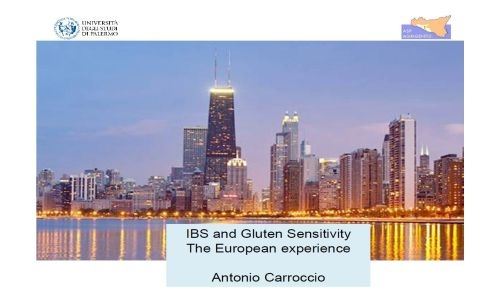
IBS & Gluten Sensitivity: The European experience (2013)
Antonio Carroccio
Direttore Medicina Interna presso ASP AG
Palermo, Italy
15th International Celiac Disease Symposium dal 22 al 25 settembre 2013 a Chicago
Direttore Medicina Interna presso ASP AG
Palermo, Italy
15th International Celiac Disease Symposium dal 22 al 25 settembre 2013 a Chicago
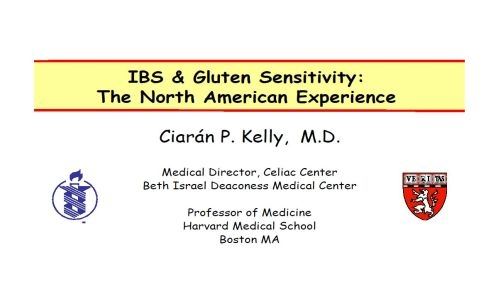
IBS & Gluten Sensitivity: The North American Experience (2013)
Ciarán P. Kelly, M.D.
Medical Director, Celiac Center
Beth Israel Deaconess
Professor of Medicine
Harvard Medical School
Boston MA, USA
15th International Celiac Disease Symposium dal 22 al 25 settembre 2013 a Chicago
Medical Director, Celiac Center
Beth Israel Deaconess
Professor of Medicine
Harvard Medical School
Boston MA, USA
15th International Celiac Disease Symposium dal 22 al 25 settembre 2013 a Chicago
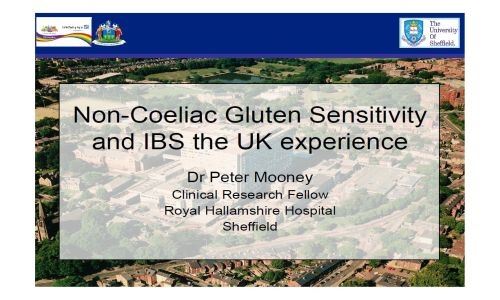
Non-Coeliac Gluten Sensitivity and IBS: The UK experience (2013)
Dr. Peter Mooney
Clinical Research Fellow
Royal Hallamshire Hospital
Sheffield, UK
15th International Celiac Disease Symposium dal 22 al 25 settembre 2013 a Chicago
Clinical Research Fellow
Royal Hallamshire Hospital
Sheffield, UK
15th International Celiac Disease Symposium dal 22 al 25 settembre 2013 a Chicago

IBS & Gluten Sensitivity: The European experience (2013)
Antonio Carroccio
Direttore Medicina Interna presso ASP AG
Palermo, ...

IBS & Gluten Sensitivity: The North American Experience (2013)
Ciarán P. Kelly, M.D.
Medical Director, Celiac Center
Beth Israel De...

Non-Coeliac Gluten Sensitivity and IBS: The UK experience (2013)
Dr. Peter Mooney
Clinical Research Fellow
Royal Hallamshire Hospital...

Non-celiac gluten sensitivity has narrowed the spectrum of irritable bowel syndrome: A double-blind randomized placebo-controlled trial
The aim of this study was to evaluate the effect of a gluten free diet on gastrointestinal symptoms in a group of Iranian patients with IBS using a double-blind randomised, placebo-controlled trial design.
148 adult patients with IBS and fulfilling the Rome III criteria were initially recruited from a private gastroenterology clinic in Tehran. Patients excluded from the study included those with a diagnosis of coeliac disease or inflammatory bowel disease, those who were already following or had previously followed a wheat or gluten free diet, those using drugs for depression/ anxiety, those using non-steroidal anti-inflammatory drugs, and those with abnormal electrolytes levels or thyroid function tests. The resulting patient sample eligible to commence a gluten free diet was 102, of these 22 patients withdrew from the study on the basis that the diet was too difficult to follow. A further 8 patients found relief from a gluten free diet but decided to withdraw as they were unprepared to follow the diet strictly. The remaining 72 patients completed the study (19 males and 53 females). Patients were randomly assigned to the gluten group (35 patients; 6 males and 29 females; mean age 44.5 +/- 10 years) or the placebo group (37 patients; 13 males and 24 females; mean age 43.2 +/- 17 years). There was no statistical difference between the 2 groups in terms of IBS sub-type. Patients completed a visual analogue symptom questionnaire at baseline to investigate primary outcomes including bloating, abdominal pain, defecation satisfaction, nausea, fatigue, and overall symptoms. Serum markers were measured for IgA anti-tTG, IgA anti-gliadin and IgG anti-gliadin antibodies, HLA typing was also performed for all patients.
All 72 patients then commenced a 6 week gluten free diet with weekly assessment by a dietitian to monitor and support compliance. After 6 weeks the gluten group were each asked to consume 100g/day (2 x 50g doses) of gluten powder (FODMAP free), the placebo group were asked to consume 100g/ day of gluten-free powder (rice flour, corn starch and glucose). Powders were mixed with warm water and consumed with breakfast and tea each day for a further 6 weeks. All patients remained on a gluten free diet for this second 6 week phase of the study.
After the 6 week challenge phase, symptoms were controlled in 25.7% of the gluten-containing group v’s 83.8% in the placebo group, indicating that 26 of the 35 patients in the gluten group became symptomatic on gluten challenge. Symptoms increased significantly in the gluten group, particularly for bloating and abdominal pain within 1 week of commencing the gluten challenge. No statistical difference was noted in serum antibody levels after gluten challenge. The authors of this study conclude that there is growing evidence that gastrointestinal symptoms in many IBS patients may be improved after gluten exclusion and differentiation between patients with IBS responsive to FODMAP restriction and those with Non-coeliac gluten sensitivity is important. This is particularly the case since evidence is emerging that a low FODMAP diet may reduce numbers of favourable bacteria in the gut (1,2). The authors went on to suggest a potential algorithm for the management of IBS patients fulfilling Rome III criteria that first implements a 6 week gluten free diet and goes on to recommend further carbohydrate restriction only in non-responders.
1. Staudacher HM, Lomer MC, Anderson JL et al. Fermentable carbohydrate restriction reduces luminal bifidobacteria and gastrointestinal symptoms in patients with irritable bowel syndrome. J Nutr 2012; 142: 1510-1518
2. Halmos EP, Christopherson CT, Bird AR et al. Diet that differ in their FODMAP content alter the colonic luminal microenvironment. Gut 2015; 64:93-100
Resource: Nutrients June 2015; 7:4542-4554
Shahbazkhani B, Sadeghi A, Malekzadeh R et al
148 adult patients with IBS and fulfilling the Rome III criteria were initially recruited from a private gastroenterology clinic in Tehran. Patients excluded from the study included those with a diagnosis of coeliac disease or inflammatory bowel disease, those who were already following or had previously followed a wheat or gluten free diet, those using drugs for depression/ anxiety, those using non-steroidal anti-inflammatory drugs, and those with abnormal electrolytes levels or thyroid function tests. The resulting patient sample eligible to commence a gluten free diet was 102, of these 22 patients withdrew from the study on the basis that the diet was too difficult to follow. A further 8 patients found relief from a gluten free diet but decided to withdraw as they were unprepared to follow the diet strictly. The remaining 72 patients completed the study (19 males and 53 females). Patients were randomly assigned to the gluten group (35 patients; 6 males and 29 females; mean age 44.5 +/- 10 years) or the placebo group (37 patients; 13 males and 24 females; mean age 43.2 +/- 17 years). There was no statistical difference between the 2 groups in terms of IBS sub-type. Patients completed a visual analogue symptom questionnaire at baseline to investigate primary outcomes including bloating, abdominal pain, defecation satisfaction, nausea, fatigue, and overall symptoms. Serum markers were measured for IgA anti-tTG, IgA anti-gliadin and IgG anti-gliadin antibodies, HLA typing was also performed for all patients.
All 72 patients then commenced a 6 week gluten free diet with weekly assessment by a dietitian to monitor and support compliance. After 6 weeks the gluten group were each asked to consume 100g/day (2 x 50g doses) of gluten powder (FODMAP free), the placebo group were asked to consume 100g/ day of gluten-free powder (rice flour, corn starch and glucose). Powders were mixed with warm water and consumed with breakfast and tea each day for a further 6 weeks. All patients remained on a gluten free diet for this second 6 week phase of the study.
After the 6 week challenge phase, symptoms were controlled in 25.7% of the gluten-containing group v’s 83.8% in the placebo group, indicating that 26 of the 35 patients in the gluten group became symptomatic on gluten challenge. Symptoms increased significantly in the gluten group, particularly for bloating and abdominal pain within 1 week of commencing the gluten challenge. No statistical difference was noted in serum antibody levels after gluten challenge. The authors of this study conclude that there is growing evidence that gastrointestinal symptoms in many IBS patients may be improved after gluten exclusion and differentiation between patients with IBS responsive to FODMAP restriction and those with Non-coeliac gluten sensitivity is important. This is particularly the case since evidence is emerging that a low FODMAP diet may reduce numbers of favourable bacteria in the gut (1,2). The authors went on to suggest a potential algorithm for the management of IBS patients fulfilling Rome III criteria that first implements a 6 week gluten free diet and goes on to recommend further carbohydrate restriction only in non-responders.
1. Staudacher HM, Lomer MC, Anderson JL et al. Fermentable carbohydrate restriction reduces luminal bifidobacteria and gastrointestinal symptoms in patients with irritable bowel syndrome. J Nutr 2012; 142: 1510-1518
2. Halmos EP, Christopherson CT, Bird AR et al. Diet that differ in their FODMAP content alter the colonic luminal microenvironment. Gut 2015; 64:93-100
Resource: Nutrients June 2015; 7:4542-4554
Shahbazkhani B, Sadeghi A, Malekzadeh R et al

Small Amounts of Gluten in Subjects With Suspected Nonceliac Gluten Sensitivity: A Randomized, Double-Blind, Placebo-Controlled, Cross-Over Trial.
Abstract
BACKGROUND & AIMS:
There is debate over the existence of nonceliac gluten sensitivity (NCGS) intestinal and extraintestinal symptoms in response to ingestion of gluten-containing foods by people without celiac disease or wheat allergy. We performed a randomized, double-blind, placebo-controlled, cross-over trial to determine the effects of administration of low doses of gluten to subjects with suspected NCGS.
METHODS:
We enrolled 61 adults without celiac disease or a wheat allergy who believed ingestion of gluten-containing food to be the cause of their intestinal and extraintestinal symptoms. Participants were assigned randomly to groups given either 4.375 g/day gluten or rice starch (placebo) for 1 week, each via gastrosoluble capsules. After a 1-week gluten-free diet, participants crossed over to the other group. The primary outcome was the change in overall (intestinal and extraintestinal) symptoms, determined by established scoring systems, between gluten and placebo intake. A secondary outcome was the change in individual symptom scores between gluten vs placebo.
RESULTS:
According to the per-protocol analysis of data from the 59 patients who completed the trial, intake of gluten significantly increased overall symptoms compared with placebo (P = .034). Abdominal bloating (P = .040) and pain (P = .047), among the intestinal symptoms, and foggy mind (P = .019), depression (P = .020), and aphthous stomatitis (P = .025), among the extraintestinal symptoms, were significantly more severe when subjects received gluten than placebo.
CONCLUSIONS:
In a cross-over trial of subjects with suspected NCGS, the severity of overall symptoms increased significantly during 1 week of intake of small amounts of gluten, compared with placebo.
Resource: Clin Gastroenterol Hepatol. 2015 Sep;13(9):1604-1612.
Di Sabatino A, Volta U, Salvatore C, Biancheri P, Caio G, De Giorgio R, Di Stefano M, Corazza GR.
BACKGROUND & AIMS:
There is debate over the existence of nonceliac gluten sensitivity (NCGS) intestinal and extraintestinal symptoms in response to ingestion of gluten-containing foods by people without celiac disease or wheat allergy. We performed a randomized, double-blind, placebo-controlled, cross-over trial to determine the effects of administration of low doses of gluten to subjects with suspected NCGS.
METHODS:
We enrolled 61 adults without celiac disease or a wheat allergy who believed ingestion of gluten-containing food to be the cause of their intestinal and extraintestinal symptoms. Participants were assigned randomly to groups given either 4.375 g/day gluten or rice starch (placebo) for 1 week, each via gastrosoluble capsules. After a 1-week gluten-free diet, participants crossed over to the other group. The primary outcome was the change in overall (intestinal and extraintestinal) symptoms, determined by established scoring systems, between gluten and placebo intake. A secondary outcome was the change in individual symptom scores between gluten vs placebo.
RESULTS:
According to the per-protocol analysis of data from the 59 patients who completed the trial, intake of gluten significantly increased overall symptoms compared with placebo (P = .034). Abdominal bloating (P = .040) and pain (P = .047), among the intestinal symptoms, and foggy mind (P = .019), depression (P = .020), and aphthous stomatitis (P = .025), among the extraintestinal symptoms, were significantly more severe when subjects received gluten than placebo.
CONCLUSIONS:
In a cross-over trial of subjects with suspected NCGS, the severity of overall symptoms increased significantly during 1 week of intake of small amounts of gluten, compared with placebo.
Resource: Clin Gastroenterol Hepatol. 2015 Sep;13(9):1604-1612.
Di Sabatino A, Volta U, Salvatore C, Biancheri P, Caio G, De Giorgio R, Di Stefano M, Corazza GR.

A Study Evaluating the Bidirectional Relationship Between Inflammatory Bowel Disease and Self-reported Non-coeliac Gluten Sensitivity.
Recent research indicates widespread use of a gluten free diet (GFD) amongst patients with Inflammatory Bowel Disease (IBD) with improvement of symptoms and disease course noted by the majority who embark on this dietary change. The aim of this study was to evaluate the prevalence of self-reported non-coeliac gluten sensitivity (SR-NCGS) in a cohort of British patients with IBD and conversely to determine the prevalence of IBD amongst individuals presenting with SR-NCGS. Three groups of patients attending the Royal Hallamshire Gastroenterology Clinic were enrolled in this study and asked to complete a validated questionnaire collecting demographic data and past/ current use of a gluten free diet; one group with IBD (n=145; 75 with Crohn’s disease and 70 with ulcerative colitis) and 2 control groups; one with irritable bowel syndrome (IBS) diagnosed using Rome III criteria (n=59) and one group with dyspepsia, attending for endoscopy (n=109). SR-NCGS was defined as self-reported gluten sensitivity in the absence of coeliac disease. Current disease extent and severity amongst IBD patients was assessed using a validated questionnaire and medical records. Patients with IBS were the most likely to have SR-NCGS (42.4%), followed by IBD patients (27.6%) and dyspeptic patients (17.4%). 15.3% of IBS patients and 13.1% of IBD patients had tried a gluten free diet for the management of symptoms, versus just 1.8% of dyspeptic patients. The current use of a gluten free diet was recorded in 11.9% of IBS patients, 13.1% of IBD patients and 0.9% of dyspeptic patients. Diagnostic outcome data from 200 patients with SR-NCGS (in the absence of CD or wheat allergy) referred to the Royal Halllamshire between 2006 and 2013 was reviewed in order to investigate the prevalence of IBD in this group. 1.5% (n=3) of patients were found to have IBD.
No significant difference was found between patients with ulcerative colitis and Crohn’s disease in terms of prevalence on SR-NCGS and gluten free diet usage. However, IBD patients with SR-NCGS were significantly more likely to have stricturing disease (p=0.046) and more active disease (p=0.002) as measured by the Crohn’s Disease Activity Index score. This indicates that the presence of SR-NCGS may be a marker for clinicians of underlying severe/ structuring disease. The mechanism for the potential therapeutic effect of a gluten free diet in IBD is not well understood. The volume/ physical properties and ‘higher residue’ nature of gluten-containing foods may lead patients to avoid such products. It is also possible that an unidentified immunological mechanism may contribute to the relief experienced by patients choosing to reduce or eliminate their intake of gluten. The absence of diagnostic markers for NCGS mean it is unclear whether individuals with IBD who self-report gluten sensitivity are sensitive the gluten or other components of wheat such as mannans, amylase-trypsin inhibitors or FODMAPs. Further studies are needed to understand whether a gluten-free diet, or indeed a wider wheat free diet may be a valuable dietetic intervention in selected patients with IBD.
Resource: Inflammatory Bowel Disease 2015 Feb 24 epub ahead of print.
Aziz A, Branchi F, Pearson K, Priest J, Sanders D.
No significant difference was found between patients with ulcerative colitis and Crohn’s disease in terms of prevalence on SR-NCGS and gluten free diet usage. However, IBD patients with SR-NCGS were significantly more likely to have stricturing disease (p=0.046) and more active disease (p=0.002) as measured by the Crohn’s Disease Activity Index score. This indicates that the presence of SR-NCGS may be a marker for clinicians of underlying severe/ structuring disease. The mechanism for the potential therapeutic effect of a gluten free diet in IBD is not well understood. The volume/ physical properties and ‘higher residue’ nature of gluten-containing foods may lead patients to avoid such products. It is also possible that an unidentified immunological mechanism may contribute to the relief experienced by patients choosing to reduce or eliminate their intake of gluten. The absence of diagnostic markers for NCGS mean it is unclear whether individuals with IBD who self-report gluten sensitivity are sensitive the gluten or other components of wheat such as mannans, amylase-trypsin inhibitors or FODMAPs. Further studies are needed to understand whether a gluten-free diet, or indeed a wider wheat free diet may be a valuable dietetic intervention in selected patients with IBD.
Resource: Inflammatory Bowel Disease 2015 Feb 24 epub ahead of print.
Aziz A, Branchi F, Pearson K, Priest J, Sanders D.

Non-celiac gluten sensitivity has narrowed the spectrum of irritable bowel syndrome: A double-blind randomized placebo-controlled trial
The aim of this study was to evaluate the effect of a gluten free diet...

Small Amounts of Gluten in Subjects With Suspected Nonceliac Gluten Sensitivity: A Randomized, Double-Blind, Placebo-Controlled, Cross-Over Trial.
Abstract
BACKGROUND & AIMS:
There is debate over the existence of ...

A Study Evaluating the Bidirectional Relationship Between Inflammatory Bowel Disease and Self-reported Non-coeliac Gluten Sensitivity.
Recent research indicates widespread use of a gluten free diet (GFD) a...
What is the connection between NCGS and IBS?
Professor David Sanders
Consultant Gastroenterologist
Royal Hallamshire Hospital & the University of Sheffield
The United Kingdom
At the Expert Meeting 2014 in Salerno, Italy.
Consultant Gastroenterologist
Royal Hallamshire Hospital & the University of Sheffield
The United Kingdom
At the Expert Meeting 2014 in Salerno, Italy.
Is there a relationship between IBS and NCGS?
Reiner Ullrich, MD
Universitätsmedizin Berlin
Campus Benjamin Franklin,
Medizinische Klinik für Gastroenterologie
12203 Berlin, Germany
At the Expert Meeting 2014 in Salerno, Italy
Universitätsmedizin Berlin
Campus Benjamin Franklin,
Medizinische Klinik für Gastroenterologie
12203 Berlin, Germany
At the Expert Meeting 2014 in Salerno, Italy
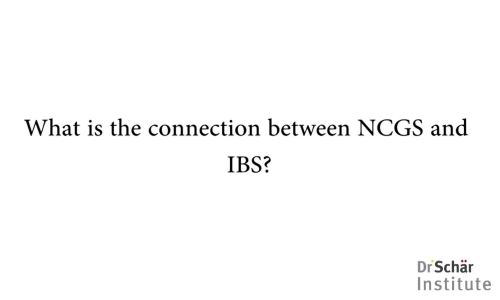
What is the connection between NCGS and IBS?
Professor David Sanders
Consultant Gastroenterologist
Royal Hallamsh...
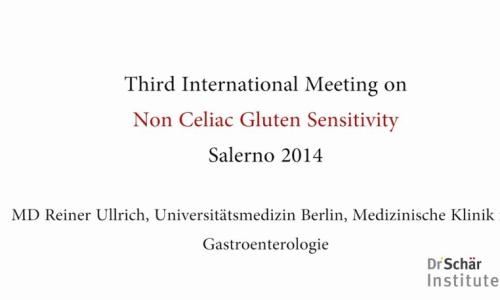
Is there a relationship between IBS and NCGS?
Reiner Ullrich, MD
Universitätsmedizin Berlin
Campus Benjamin Frankl...
www.drschaer-institute.com
